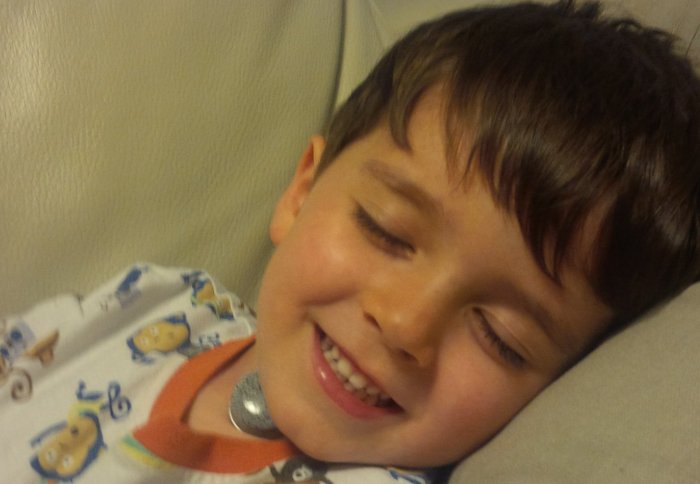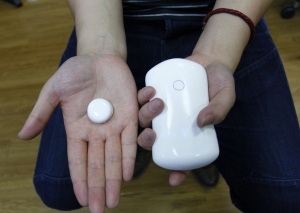Imperial team behind wearable sensor among finalists in global competition
by Colin Smith

A device that analyses the body's sounds to detect illnesses has propelled an Imperial team to the finals of a global competition.
The GUES team from Imperial College London are in the final round of the $US 2.25 million Nokia Sensing XCHALLENGE. The Imperial researchers are the only UK based team to be selected as a finalist in the XCHALLENGE. This is an international competition to develop breakthrough medical sensing technologies that will ultimately enable faster diagnoses and easier personal health monitoring. Teams are competing for a $525,000 Grand Prize and up to five Distinguished Awards, each valued at $120,000.
Readers have the opportunity to help determine if team GUES wins the Nokia Sensing XCHALLENGE competition. You can vote for team Gues, by clicking on the "vote for this" button at the bottom of their video. Watch the video and vote for team Gues.
The researchers have developed a wearable, wireless device, the approximate size of a pound coin, which sticks onto a person’s neck or chest to detect sounds emanating from the heart and respiratory system. AcuPebble uses advanced algorithms to sift through a range of sounds to determine only the ones that may indicate deteriorating health or illness in patients.
A versatile sensor
Based on their research and development work over the past five years, the Imperial team believes that AcuPebble could be used in a range of clinical settings including as a diagnostic tool, a health monitor and as an early warning device. The hope is that the sensor will collect data in real-time and transmit this information to an application that could be downloaded onto any smart device, so that doctors can monitor their patients anywhere in the world.

AcuPebble is the size of a one pound piece
The researchers believe that AcuPebble could be used to improve the diagnosis of a range of respiratory and cardiac conditions, including sleep apnoea, whooping cough, pneumonia, chronic obstructive pulmonary disease and congestive heart failure.
Team GUES is led by Dr Esther Rodriguez-Villegas, along with her research assistants Guangwei Chen and Syed Anas Imtiaz, who are all part of the Department of Electrical and Electronic Engineering at Imperial College London.
Dr Rodriguez-Villegas said: “Hundreds of millions of people suffer every day from chronic respiratory diseases. It is almost certain that many of us will be faced with these health conditions in our lives. However, there aren’t sufficient resources for doctors to give an early and quick diagnosis to everyone. We need accurate and reliable technologies that can speed up diagnosis and free up resources in hospitals, while also improving the quality of life for patients. We believe that AcuPebble can provide an easy-to-use diagnostic tool, making personal health information accessible to trusted sources anywhere in the world, ultimately improving how we look after ourselves.”
Test run
The researchers, in conjunction with academics from the National Hospital for Neurology and Neurosurgery, have also carried out a small pilot clinical study using the AcuPebble. The trial consisted of 30 people, including 20 controls and ten patients who had been referred to the hospital with suspected sleep apnoea. The team found that AcuPebble could automatically detect at least nine out of ten individual apnoea episodes in those included in the pilot study.
AcuPebble was able to automatically analyse a range of acoustic signals from both inside and outside the body to determine the sounds that could indicate sleep apnoea. For example, the sensor analysed turbulence in the airways, which can indicate an obstruction, the depth and duration of breathing and other vital signs such as a person’s heart rhythm. The device was able to provide accurate information about breathing rate, heart rate and lung volumes and the type of apnoea a patient was experiencing.
The finals
In early November 2014, the Imperial team fly to Los Angeles to take part in the finals of the XCHALLENGE competition. The winning teams must demonstrate the highest merit in the areas of accuracy and consistency, demonstrating the quality of their devices, technical innovation, market opportunity for their products, originality, and the quality of the user experience.
The winning teams will be announced on 10 November 2014. The final phase includes an online voting campaign accounting for ten per cent of a team’s overall score, with the remainder evaluated by a judging panel comprised of digital health and medical industry experts.
Article text (excluding photos or graphics) © Imperial College London.
Photos and graphics subject to third party copyright used with permission or © Imperial College London.
Reporter
Colin Smith
Communications and Public Affairs